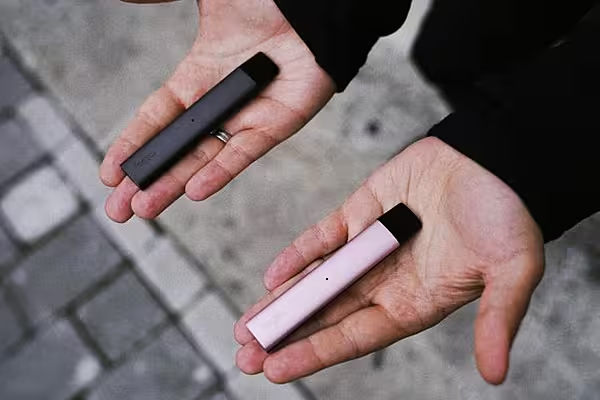Japanese lawmakers are just weeks away from proposing changes that could erode tax advantages for Big Tobacco’s new hope: heat-not-burn products that deliver a nicotine hit without all the smoke and tar of traditional cigarettes.
Changes in Japan may also serve as a template for legislators in other countries as global sales accelerate toward an estimated $15 billion by 2021. Any shift will be important for Philip Morris International Inc., British American Tobacco Plc and Japan Tobacco Inc., which profit from lower taxes and have invested heavily in the new products in Japan.
Wider Debate
Amid a broad debate on raising revenue to cope with Japan’s debt, while trying to curb the health costs caused by smoking, rival groups within Prime Minister Shinzo Abe’s ruling coalition must decide whether to base levies on weight, per unit, or even nicotine content. The new products are currently taxed by weight, like pipe tobacco, while the levy on cigarettes is per stick.
In the European Union, where taxes on heat-not-burn are also lighter, authorities are collecting more information for a study next year before any systematic change. The U.S. has no federal system for taxing these products, although some states and localities have imposed levies.
“Whatever happens in Japan now, you’re gonna see that probably put into people’s numbers for the wider global markets,” said Owen Bennett, an analyst with Jefferies in London. “I think it’s the key data point in terms of how people view this space going forward.”
Political Divisions
With the clock ticking for the coalition’s tax panel to produce a proposal by mid December, lawmakers are still a long way from arriving at a consensus position, according to people familiar with the discussions. The people, who asked not to be named because the talks are private, describe three broad groups:
The largest, drawn from the mainstream of Abe’s Liberal Democratic Party, wants the tax rate on all heat-not-burn products largely equalized, and raised to the level of regular cigarettes. They are driven by the need to increase revenue and believe levies on most tobacco products should keep rising slowly.
Compromise Options
Officials in the finance ministry, which will play a key role in drafting and implementing any changes, are broadly aligned with the LDP mainstream view, said people with knowledge of the matter. A spokesman for the ministry declined to comment.
Political analysts expect the tax-hike camp to give some ground to the tobacco caucus and the Komeito, but they warn it isn’t possible to determine how much yet. If negotiations prove too difficult, lawmakers could even defer making changes.
There could be a tax hike that narrows but doesn’t eliminate the gap between regular and next-generation products, said Jun Okumura, a visiting scholar at the Meiji Institute for Global Affairs in Tokyo. That would be something for everyone and could get a favorable response in the media, he said.
The Companies
Tobacco companies have argued it’s too early to formulate new tax systems for heat-not-burn and that for now governments should focus on encouraging smokers to switch over to potentially less harmful alternatives.
“We definitely believe we should wait and see before making a decision,” said Ryosuke Tsuji, head of regulatory and public affairs at BAT Japan. The company has moved rapidly with its glo device in Japan, going from sales in test markets to nationwide within a year.
Japan Tobacco’s outgoing president, Mitsuomi Koizumi, said a large increase in tax would be "troublesome for consumers." A spokesperson for Philip Morris said the company is watching the debate in Japan but declined to provide detailed comments.
Although the $5 billion global market for heat-not-burn is a fraction of the $680 billion market for regular products, it may triple in size over the next four years while the traditional market stagnates, according to Euromonitor International estimates. The market for e-cigarettes, which work by heating and vaporizing nicotine-laced liquid, is still bigger than heat-not-burn.
Philip Morris, which introduced its IQOS line in Japan in 2014, sold more HeatSticks in the country for the device last quarter than regular cigarettes. HeatSticks now account for about 12 percent of the nation’s total tobacco market, according to the company.
This makes Philip Morris most vulnerable to a tax hike right now, according to Jonathan Leinster, an analyst at Berenberg in London. He said that while Japan Tobacco, the former government monopoly, is still the smallest player in the new field, it stands to lose from any change from the current weight-based tax because of the lightness of units for its Ploom Tech device.
Share Performance
Japan Tobacco shares have slumped 3.8 percent this year, while BAT and Philip Morris International have each climbed more than 10 percent.
Even though any hike may reduce the incentive for smokers to switch over to these potentially safer products if Big Tobacco passed on the cost on to consumers, heat-not-burn products are likely here to stay.
"Whether they want it or not, the opportunities at the moment are within these next-generation nicotine delivery devices," said Ivan Genov, a tobacco analyst at Euromonitor in London. "This is the area where future growth is, even if taxation is at higher level."
News by Bloomberg, edited by ESM. Click subscribe to sign up to ESM: The European Supermarket Magazine














